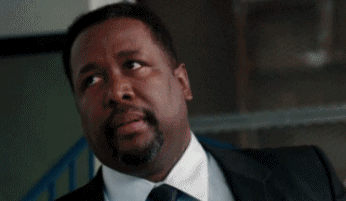Shonda Rhimes had her Year of Yes. A.J. Jacobs had his Year of Living Biblically. At the end of 2020, and feeling rather... 2020ed, I decided that 2021 was going to be my Secret Year of F You (euphemism for the delicate among us).
I sense some pearl-clutching. Stay with me.
The keyword is secret. I never actually SAID the phrase to anyone. It was silent self-fortification, a tough-love reminder to unapologetically stand my ground even when someone else won’t like it. Even when that someone is me.
See, I'm a worrier. And I have a high level of imposter syndrome. So when I imagine, for example, speaking to a prospective client about my rates, this is the conversation that happens in my head.
Imaginary Me: My rate for this project is $X.
Imaginary Client: $X?! How dare you?! That is offensive! Who do you think you are?!?!
Imaginary Me BEFORE secret theme phrase: I'm sorry! You’re right! What do you want to pay me? Please still want to work with me!
Playing this conversation in my head, I tended to lowball my rates for fear I would "offend" a prospective client.
But...
Imaginary ME AFTER secret theme phrase: You’re offended by my rate? F you. You can’t afford me, say so, but I have every right to charge what I charge. I’m worth it.
My resolve steeled, I would set my rates more appropriately. Then, here's how the actual conversation usually went.
Me: My rate is $X.
Client: That's above our budget.
Me: I'm happy to discuss adjusting the scope to fit with your budget. What are you thinking? Let's see if I can work with that.
Indeed, prospective clients rarely expressed irritation or offense at my rates (and certainly not to the extreme degree I’d pictured!). Imagining that was the good old imposter syndrome at work. But even when they said, “that’s outside our budget” or “that’s higher than I was expecting,” I learned not to apologize or backpedal. I’m always happy to try to find a meeting of the minds, but now that means we each give a little. Before, my mindset was more: “Oh no! Bend over backwards to get this client! Offer my basement floor minimum and be willing to go even lower!”
But, you may ask, why the choice word, even silently? Why not say "No, sir" or "shut up" or "Bless your heart" in my head? It's because sometimes you need that uncompromising slap-in-your-own-face harshness to remind you to not fold like a cheap lawn chair. You need to be able to reach your inner tough, take-no-prisoners badass bitch, and unleash her (or him/them) on … yourself. There's just no negotiating with – no euphemism – "fuck you." Then when it’s time to actually negotiate with another person, it’s in an "I move, you move" kind of way, not in an "I’m sorry, I'll give in" way.
Or, let's imagine a conversation between what we'll call my Inner Worrier and my Inner Warrior.
Worrier: Oh no, will Prospective Client be offended by my quarterly/semi-annual follow-ups? Will they think I'm too pushy?
Warrior: If you're put off by a check-in email 2-4 times a year, f___ you. If you want me to stop, say so, don't just hope I'll go away, you weenie.
Inner Warrior doesn't suffer fools. Inner Worrier wastes a lot of my time.
But more often than not, the secret "eff you" was more self-directed.
Struggling to hold that yoga pose? Duck you, discomfort, I can overcome you. Drowning in panic and self-doubt? F you, anxiety, I am stronger than you (or at least I'm doing a lot of therapy and deep breathing). Losing my …. shiitake mushrooms at the child/spouse when they don’t really deserve it? Felix Unger, bad temper, I am learning patience and mindfulness.
Now, did this exercise always have its desired effect? Of course not. I didn’t always have the fortitude to say no, or keep my calm, or hold my ground (or hold that warrior two pose), but it reminded me – and I remind you: A, to not always sweat what other people think so much; B, to ask for what you want; and C, we are stronger than we think we are. And as a result, I made some meaningful strides in both my personal and my business life, including turning down prospective bad clients rather than working from a fear-based scarcity mindset, and increasing my year-over-year income by nearly 70 percent. Anyway, I recommend this tactic.
I'm going to continue silently applying my no-longer-secret phrase moving forward, but I think I've internalized the practice enough that I can choose a new central theme for 2022, maybe even a not-secret one. I'm working on what that might be. Stay tuned.







